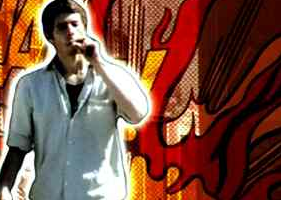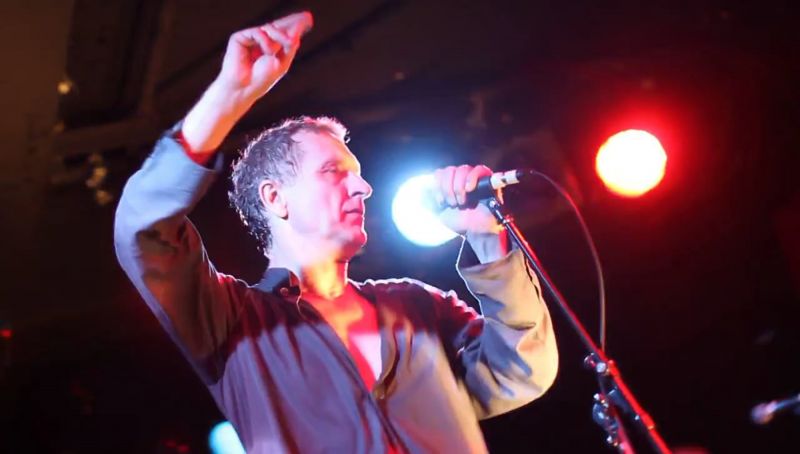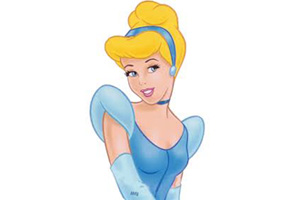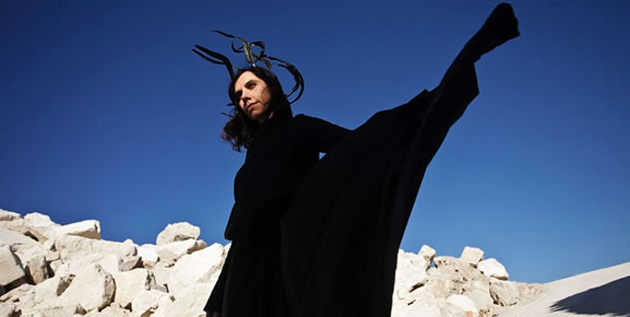
Let England Shake, the brand new album from British rocker Polly Jean “PJ” Harvey, is an ethereal eulogy to her homeland: a dozen songs of militarism, death, and ambivalent patriotism delivered with uncharacteristic lightness. Harvey, of course, first rose to fame in the early 1990s on the raw power of her delivery. Performing with her PJ Harvey Trio, she released Dry, a highly acclaimed indie debut that led Rolling Stone to dub her 1992’s best songwriter and best new female singer. Her follow-up recordings Rid of Me and To Bring You My Love, both on Island Records, brought forth a flurry of Grammy and Mercury Prize nominations, and yet more critical raves—both for Harvey’s songwriting and her theatrical stage presence.
In contrast with her music, Harvey is guarded in conversation. Her publicist asked for my assurance that I would avoid “celebrity-type” questions, and I figure she’s earned that right. After 20 years of performing, her musical accomplishments and collaborations with rock-and-roll luminaries (Thom Yorke, Josh Homme, Nick Cave) are too numerous to list. But suffice it to say that Let England Shake is pretty different from what her fans are used to.
Tackling such grim topics was a bold and risky move—as was performing the title track on BBC television in the presence of outgoing prime minister Gordon Brown. New Yorker pop-music critic Sasha Frere-Jones contrasted her somewhat twee vocal delivery with the grit of earlier Harvey incarnations, yet Harvey told me she deliberately crafted this vocal style as a counterpoint to the heavy stuff she’s singing about. We also spoke about her rural roots, her disastrous first gig, and her dicey relationship with the press.
Mother Jones: I’ve been listening to your new album a lot. It’s quite beautiful.
PJ Harvey: Thank you. I’m glad you like it.
MJ: There’s this sense of deeply aggrieved patriotism, this mourning for England in its entirety—yet you don’t consider it a protest album?
PJH: It’s hard to say what that means, exactly. I knew that I wanted to address these matters, this very weighty subject matter, but I didn’t want to do it in a way that felt too heavy-handed, and by that I mean I didn’t want to come across as if I was preaching or becoming too self-important. That was very much in the forefront of my mind as I was writing these words, wanting to get the balance right between delivering words that were meaningful, but situated in a way that was also palatable enough for people to receive them.
MJ: There does seem to be more directness in this than in some of your past stuff.
PJH: I wanted to present ideas, but I also wanted to leave it open enough for people to bring in their own feelings to the songs, to the ideas being presented. I wanted a certain ambiguity.
MJ: Compared to your past albums, this one seems more reflective of the world and its woes. What inspired these images of war and death?
PJH: I’ve always felt that I’m affected by the world, by the way we treat each other, by the way different countries treat each other. I’ve always been very affected by politics, society, but I never got to a place as a writer where I felt like I could begin to deal with such things and do it well. I think I finally have the confidence to begin to approach such things. I’m not an autobiographical writer, but I am a writer who deals with human emotion on all levels. And at this particular point in time, it’s human emotion in relation to the world and specific events.
MJ: I understand you’re collaborating with war photographer Seamus Murphy, whose work is amazing. What’s that project about?
PJH: When I was writing this record, in 2008, I was in London for an exhibition of Seamus’ work, entitled Darkness Visible. That was work from the last 10 years in Afghanistan, and I was very affected by it. So I got in touch afterwards to see if he was interested in doing portrait work with me, or whether he’d ever done such a thing. And he hadn’t particularly. He’s mostly a photojournalist in conflict areas, but he was willing to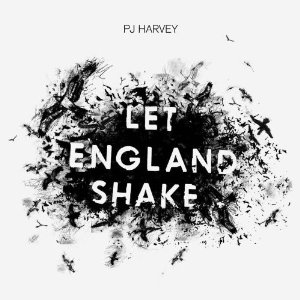 have a go. I sent him the demos and the lyrics, and he was interested in working with me. He’s made some films for the songs: “The Last Living Rose” is up on my website. The next film is for “The Words That Maketh Murder.” We’ll be putting them out regularly. Then he’s going to edit a short documentary film of his own response to the music. He chose to make a road trip around England and make a photo montage of what he sees.
have a go. I sent him the demos and the lyrics, and he was interested in working with me. He’s made some films for the songs: “The Last Living Rose” is up on my website. The next film is for “The Words That Maketh Murder.” We’ll be putting them out regularly. Then he’s going to edit a short documentary film of his own response to the music. He chose to make a road trip around England and make a photo montage of what he sees.
MJ: You said your work isn’t autobiographical, but has your family been affected directly by war?
PJH: Yes, my family in past generations certainly has, on both sides.
MJ: Tell me more about your family. You were raised on a sheep farm in Corscombe, a little tiny village in Dorset. Was that idyllic or sort of lonely?
PJH: Well, that’s actually got a bit out of proportion. My father is actually a quarry man—he deals in stone. He also at one point had a lot of sheep, he owned a sheep farm, but primarily the family business was in stone.
MJ: So the farm was incidental, not a working farm?
PJH: No, it wasn’t a working farm, but I did grow up in the countryside being very aware of nature and the cycle of life, and I feel very grateful for that.
MJ: What was your family life like? Do you have siblings?
PJH: Yes, I have a brother, an older brother.
MJ: What sort of kid were you?
PJH: I’m not somebody that enjoys talking about my personal life, I’d rather you ask me about my current work.
MJ: Yes, your publicist said you have a distaste for what he called “celebrity-type” questions. Do you have kind of an ambivalent relationship with the press?
PJH: I’m a very private person, so obviously I don’t enjoy talking about more personal matters. But at the same time I care very much about my work and I would like people to know that it exists. So I appreciate that there’s a meeting point, where I would like people to know about the work that I’m doing, and that requires me to talk about it.
MJ: Do you have any pet peeves about the way you’ve been portrayed?
PJH: I don’t hold onto anything, because it’s a waste of energy to do so, really. There’s nothing that I can do about the way people want to write about me. I just try and concentrate on my work and do that as well as I can.
MJ: I guess I mean, are there any misconceptions you’d like people to know about?
PJH: It seems rather pointless for me to go over everything and try to set the record straight. People will think what they will and that’s the way that life is.
MJ: I did notice that people often ask you about feminism. Is that the lot of female performers, to be held up as role models for their sex?
PJH: I’ve never aligned myself with any particular cause other than trying to do good work and get better at it; it’s not something that I think about very much.
MJ: Now, I gather your parents were very into music, especially the blues. Did they play, too?
PJH: They didn’t play music; they weren’t musicians. But they did have a great love for music and the house was always full of music when we were children—and it still is now.
MJ: Did they get you playing as a kid?
PJH: They were very supportive, so it was very natural for me to want to go into music. But at the same time they were very open to letting me and my brother do whatever we wanted to choose; we weren’t made to learn instruments or anything like that. I started playing the saxophone when I was quite young, in school.
MJ: Did you sing in a choir or anything?
PJH: Not really. I started with the saxophone and then later guitar. And I wrote lyrics from a very young age, poems and short prose. It came very naturally then to marry that with the guitar—the guitar was a much easier instrument to marry words with than the saxophone.
MJ: Well, sure, you can’t exactly sing and play the saxophone! Did you consider them lyrics at that point, or was it more like poems?
PJH: In the early stages they were just very much song lyrics. It’s only in the last three or four years that I feel I’ve looked at words much more in the way that one would a poem, how they work on the page, to be read out loud separately from music. That’s happened quite recently.
ML: Your mother was a sculptor?
PJH: My mother worked in stone, letter-cutting mostly, and carving—cutting letters for house names or gravestones. She did mostly functional, commissioned work. Myself, I’ve always been active artistically, painting and sculpting and drawing. For me it’s purely aesthetical work, and it often goes hand in hand with what I’m writing.
MJ: I’ve never seen your visual artwork. Would you describe it a bit?
PJH: I designed a magazine the summer of last year for Francis Ford Coppola called Zoetrope: All-Story. If you go to the website, you can find the edition I designed, with a lot of my work in it. I just recently started oil painting, so I’m very interested in that at the moment. I’m hoping at some point in the next couple of years to put out a little book of some of my poems and some of my paintings.
MJ: Just after high school, you were playing in bands and also studying art and sculpture. Were you hoping one thing or the other might pan out as a profession?
PJH: I was actually thinking that I would become a visual artist. When I was in art school I was playing in bands and putting my own bands together, but it seemed rather preposterous to think of that as a way of having a career. I think I was trying to move into an area where I thought I might be able to teach, or have some kind of career. I didn’t know that music was a possibility, although it was a great love. I didn’t know where my life would take me, because it’s a very difficult avenue to get into, really.
MJ: Early on, you joined John Parish’s band, Automatic Dlamini, and have been collaborating with him ever since—including on the new album. How would you describe your relationship?
PJH: It’s very valuable as a writer to have somebody who can be honest with you, whom you respect greatly in their own right. I think that’s why John and I work together well. We’re very honest with each other, and very critical of each other’s work in a very productive way.
MJ: Is it hard for you to take criticism?
PJH: I don’t find it hard at all. I find I gain a great deal from constructive criticism from people, and I value it enormously.
MJ: Now, you started your own band in 1991. I’ve read that at your first show somebody actually offered to pay you to stop playing. Is that true?
PJH: [Laughs.] Yes, that is true.
MJ: But you recovered pretty fast. By 1992, Rolling Stone was calling you the year’s best songwriter, the critics were raving about Dry, and record labels were knocking down your door. Were you kind of blown away by the pace?
PJH: Yes, it was a surprise, and it happened very quickly. It was a wonderful surprise. I was taken aback by it.
MJ: So this very private person is all of a sudden launched into the spotlight. Did you find that difficult to deal with?
PJH: It was something that I adjusted to. Initially it was very difficult. It took me a while to find my footing with it, to find a way to be with it.
MJ: What sort of problems did it raise for you? Were people approaching you in the street?
PJH: I’m not recognized very often at all—even now, actually. I find interviews very difficult, but again, it’s something that you adjust to. Also entering into the world of the music business, where it’s not just about playing the music. If you want to put out records there’s an enormous amount of administration that goes alongside that, and that was something again that I had to learn about.
MJ: Well, I hope I’m not making the interview process too difficult for you.
PJH: No, I’ve had some time to acclimatize at this stage in my life. [Laughs.]
MJ: What question would make you want to hang up the phone?
PJH: Well, you can keep trying and you’ll find out!
MJ: I hope not. To change the subject, your approach to music has been sort of in the David Bowie mold, where each record is a new incarnation. What motivates that?
PJH: I have a great desire to learn, and that’s always been with me. I want to explore and keep trying to find new ways of saying things. Because in that way you can almost hear something for the first time, or see something for the first time, and then it can have a great deal more meaning.
MJ: What are some of your muses—people, places, artists, that inspire your writing?
PJH: I’ve been reading a lot of Harold Pinter, particularly his poetry and his political essays. Musically, I tend to listen to the older artists like Nina Simone or Neil Young, Bob Dylan, the Doors. In terms of contemporary artists, I really like The Fall. And Jerry Dammers; I was really struck by a recent performance by his Spatial AKA Orchestra. It left me speechless. It was absolutely incredible. Visual artists: Again and again I get drawn into Francisco Goya, Velázquez, Salvador Dali—I come to these people again and again. And the films of Stanley Kubrick, I’ve watched those many, many times.
MJ: Your new record feels very different, vocally. It feels like you’re experimenting. At times it’s almost Kate Bush-like.
PJH: With this particular album, with these words, it took me a long time to find the right voice: I didn’t want too much weight in my voice, because it made the words too self-important. I finally found the right way in which to sing them, and often that voice is quite small and quite volatile, and can move all over the place.
MJ: Yes, there’s an ambiguous lightness to it.
PJH: That was very intentional. It needed to be. What I said earlier about needing to leave the songs open for people to come in with their own ideas.
MJ: Do you ever listen to your old stuff?
PJH: Very occasionally, not very often.
MJ: Is it hard for you to hear your past incarnations?
PJH: Not at all, because I feel quite separate from them and I can view them quite objectively. So it’s pleasant. But it’s not something I naturally do, because I’m too interested in making new things.
MJ: When you do look back, what are you most proud of?
PJH: One of the highlights for me was actually playing “Let England Shake” on the Andrew Marr Show in front of Gordon Brown, who was then our prime minister. That was something I’ll remember for a long time. If I look at bodies of work, I still feel very proud of Is This Desire? and To Bring You My Love. I think they were strong pieces of work for me, and they stayed with me over the years. I felt I was working very well and very strongly, and that’s something that one always aims for but you don’t always get. It requires a lot of different parts coming together at the right moment in time, and both records were blessed with that. And I’m proud of White Chalk because I feel like that was a very unusual record, and I don’t tire of that one either.
MJ: For the record, my wife says you were her idol. But she’s exactly your age. Do you feel like you’re still reaching new audiences, especially younger ones?
PJH: I’d like to think that that’s the case, I don’t know for a fact. But I would love for people to hear my music, for new people to come across it. I’d like people to enjoy it of all ages, and I’d be thrilled if that was the case.


